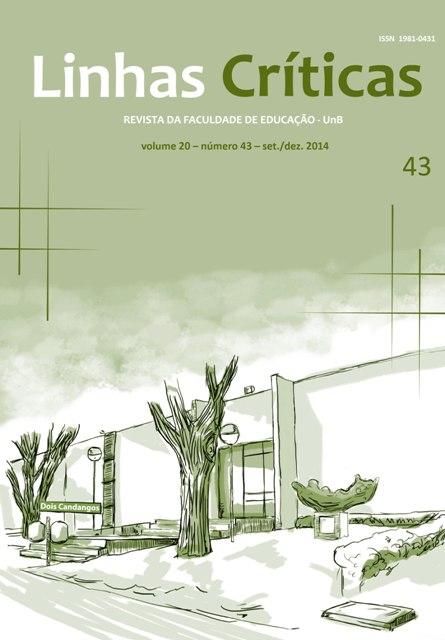The development of Reuni: a review of its implementation and economic relations
DOI:
https://doi.org/10.26512/lc.v20i43.4389Keywords:
Reuni, Federal Universities, ExpansionAbstract
This article aims at analyzing and discussing some consequences of the implementation of the Support Program for Restructuring Plans of Federal Universities (Reuni), in Brazil, since its implementation in 2007. To that end, the approach is based on official documents, numbers taken from the expansion of universities, statistics, information about expansion and restructuring and their discussion, in order to reveal an economical and administrative bias of Reuni that is not written in its articles and General Guidelines. More than a simple program, Reuni is a key part in recomposition of productive capital and the transformation of the methods of administration of the state and of public policies.
Downloads
References
Brasil. Lei nº 9.394. Lei de diretrizes e bases da educação. Brasília, 1996.
Brasil. Decreto nº 6096, de 24 de abril de 2007. Programa de Apoio a Planos de Reestruturação e Expansão das Universidades Federais ”“ REUNI. Brasília, 2007 a. Disponível em: <http://www.mec.gov.br>. Acesso em: 07 set. 2011.
Brasil. REUNI ”“ Diretrizes Gerais. Brasília, 2007 b. Disponível em: <http://portal.mec.gov.br/sesu/arquivos/pdf/diretrizesreuni.pdf>. Acesso em: 07 set. 2011.
Brasil. Plano de desenvolvimento da Educação: razões, princípios e programas (PDE). Brasília, 2007 c. Disponível em: <http://portal.mec.gov.br/arquivos/livro/livro.pdf>. Acesso em: 11 fev. 2012.
Brasil. REUNI 2008 ”“ Relatório de Primeiro Ano. Brasília, 2009. Disponível em: <http://www.mec.gov.br>. Acesso em: 07 set. 2011.
Brasil. Resumo técnico: censo da educação superior 2011. Brasília, 2013.
Brasil. Lei de incentivo à pesquisa. Disponível em: <http://portal.mec.gov.br/index.php/?option=com_content&view=article&id=12311>. Acesso em: 11 nov. 2013
CUNHA, Luiz Antônio. A universidade reformanda ”“ o golpe de 1964 e a modernização do ensino superior. Rio de Janeiro, Francisco Alves, 1988.
FERREIRA, Suely. Reforma da educação superior no Brasil e na Europa: em debate novos papéis sociais para as universidades. 2010. Disponível em: <http://www.anped11.uerj.br/reformadaeducacaosuperior.pdf>. Acesso em: 31 out. 2013.
HARVEY, David. A condição pós-moderna. Uma pesquisa sobre as origens da mudança cultural. São Paulo: Edições Loyola, 1994.
LIMA, Kátia Regina de Souza. Universidades federais e o REUNI: alterações nas funções da universidade pública brasileira. Revista Advir, Rio de Janeiro, nº23, dezembro de 2009, p. 20-27. Disponível em: <http://www.asduerj.org.br/images/advir/pdf_revista/Advir23online.pdf>. Acesso em: 11 set. 2012.
MANCEBO, Deise. Trabalho docente na educação superior brasileira: mercantilização das relações e heteronomia acadêmica. Universidade de Minho, 23(2), pp. 73-91. Revista Portuguesa de Educação, 2010.
MARX, Karl. O capital: crítica da economia política. 29. ed. Rio de Janeiro: Civilização Brasileira, 2011.
SILVA JR, João dos Reis. O professor pesquisador nas universidades públicas no contexto da internacionalização do capital: a produtividade do trabalho imaterial superqualificado. 22 (jan-jun). Revista Portuguesa de Educação, 2009.
Downloads
Published
How to Cite
Issue
Section
License
Copyright (c) 2016 Linhas Críticas

This work is licensed under a Creative Commons Attribution 4.0 International License.
Authors who publish in this journal agree to the following terms:
-Authors maintains the copyright and grants the journal the right of first publication, the work being simultaneously licensed under the Creative Commons Attribution License which allows the sharing of the work with recognition of the authorship of the work and initial publication in this journal.
- Authors are authorized to enter into additional contracts separately, for non-exclusive distribution of the version of the work published in this journal (eg publish in institutional repository or as a book chapter), with acknowledgment of authorship and initial publication in this journal.
-Authorers are allowed and encouraged to publish and distribute their work online (eg in institutional repositories or on their personal page) at any point before or during the editorial process, as this can generate productive changes as well as increase the impact and the citation of published work (See The Effect of Free Access).



